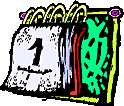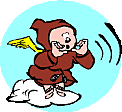With The Commentary of the RABAM

After Death, Parshas Post Mortem, being a long disquisition about prohibitions, bestiality, blood, Sabbath, idols, etcetera. Inspirational.
In this week's parsha, Acharei Mois, the Aimishteh commands Klal Yisrael regarding forbidden relationships: " The nakedness of your father's wife you should not expose...your father's sister...your mother's sister...a woman and her daughter...two sisters..." And so on.
The nakedness of your father's wife: Vayikra 18:8 ervat eshet avicha lo tegale ervat avicha hiv (The nakedness of your father's wife you shall not uncover, it is your father's nakedness). Your father's sister: Vayikra 18:12 ervat achot avicha lo tegale (You shall not uncover the nakedness of your father's sister). Your Mother's sister: Vayikra 18:13 ervat achot imeicha lo tegale (You shall not uncover the nakedness of your mother's sister). A woman and her daughter: Vayikra 18:17 ervat isha uvita lo tegale et-batbena va et-batbita (you shall not uncover the nakedness of a woman and her daughter, her son's daughter and her daughter's daughter).
Shoyn, you know too much about nakedness.
Ervat = Nakedness, unchasteness. The word has a connotation of sexual
indecency and zestiness.
Oy vey. I must tell you, I am a little uncomfortable with this week's Parsha. In fact, I am downright sickened by the suggestion of having relations with one's own mother. And I am completely nauseated with the thought of having gilui arayois with my aunts; both my father's and my mother's sisters have beards, as well as shaytals that look far more titilating on the styrofoam heads
sitting on the dresser.
The Gemara (in Shabbos 23a) makes clear that it is the sins relating
to Gilui Arayois (improper sexual behavior) for which the Jews were exiled from the land of Israel. Rashi believes that Israel is incapable of tolerating such nastiness. And this is strongly indicated by a further passage in Vayikra: Leviticus 18:24 through 28 - - altitamu be kholele ki va kholele nitm'u ha-goyim asherani meshaleakh mipneichem (Do not pollute yourselves with any of these things; for in all these things were the nations before you polluted when I threw them out). 18:25 - vatitma ha'arets vaefkod avona aleiha vataki ha'arets et-yoshveiha (And the land was filthy, so I visited its iniquity upon it, and the land spewed out her inhabitants). 18:26 - u-shemartem atem et-chukotai va et-mishpatai va lo ta'asu mi-kol ha-toevot ha-ele ha-ezrakh va ha-ger ha-gar batochachem (so you shall keep my laws and my ordinances, and shall not do any of these nasty things; neither the native-born nor the stranger that lives among you...) - 18:27 - ki et-kolhatoevot ha-el asu anshei-ha'a'rets asher lifneikhem va-titma ha'arets (for all these nasty things were done by the men of the land that were there before you, and the land is defiled...) 18:28 va lotaki ha'arets et-khem ba tama'akhem ota ka'asher ka'a et-ha-goi asher lifneichem ( that the land spew you out also, when you defile it, as it spewed out the nation that was before you). Pollution and spewing - I could go on and on.
Sheytel = Wig. Many orthodox women shave their hair upon marriage, and wear a wig from that day forward, out of a sense of modesty and bad style choices. Think bald head, think fright-wig, and frightening without the wig. Others merely cover their hair with a wig (same sense of modesty and style).
So by the time the parsha gets around to talking about doing it with two sisters, I am totally not in the mood.
An obvious question arises about the wording of the possuk: Why does the Toirah speak of "not exposing nakedness"? How should we understand this term? One answer offered by the RAMBAN is that the Toirah chose to speak in loshoin nokiyus in order to avoid the parsha receiving an "R" rating, so that children under the age of seventeen, an important demographic, can read the parsha without being accompanied by a parent.
Loshoin = Lashon; language, dialect, way of speaking.
Nokiyus = cleanliness, as in loshoin nokiyus = censored language. Ironically, the word sounds like Nucky, related to Nakt (naked) or Naken (naked business)
or Nuken (Germanic: engaging in congress of the flesh; hence similar to British slang 'knocking').
The RIF holds that the possuk clearly means to include actual biyuh, but the use of the term "exposing nakedness" is chosen to include voyeurism, digital photography, and Internet chat. But the RAN holds farkhert -- you can have relations with anyone you want, so long as the lights are dim, in order to ensure deniability.
The Rif = Rabbi Yitzhak Alfassi, 1013 - 1103. The author of the 'Sefer
Ha Halakhot' (The Book of the Laws), a readers digest of Talmudic legalism.
Possuk = discussion, passage, verse.
Farkert = Absolutely wrong. As long as the lights are dim - but this
is contradicted by the example of Jacob, who encountered Leah when the lights were dim (Bereishis, Parshas Vayetzei).
A more serious question is why is it that the halochois of all of these forbidden relationships are addressed to men? Shouldn't women be concerned about these issues as well? RASHI answers that since women come so late to shul, they miss the leyning anyway, so they are not included. But the ARI holds that this parsha is proof that in the time of the Moshiach, our frigid wives will put out the way they have been promising to for years.
Halochois = Legal opinions.
Leyning - the chanting of the Torah passage from that week's reading.
"Since women come so late to shul" = and there is no place where women do not come late to school.
ARI = Adoneinu Rabbi Itzhak (our master Rabbi Isaac), Rabbi Itzhak Ben Shlomo Luria (1534 - 1572), the lion of Kabbala; a Jerusalemite Talmudist and Kabbalist of great repute, also known as the AriZal (ARI + Z.L.; the Ari, whose memory (zichrono) is a blessing (levrocho). An associate of the prophet Elijah, hence the allusion to the Moshiach, whose place and time are foreknown by him.
Moshiach = the anointed one. Anointed (m+shech) referring to the coating of oil which sanctifies a person or a well-tuned engine. But know that applying the oil oneself is not kosher. Put away that tarpaulin, you mechutzif!
But with all of these forbidden relationships, the one which receives the most attention, especially in our days, is the ban on male homosexuality. How are we to understand this biblical pronouncement, especially in modern society?
Reb Shlomo Kluger, living a century ago, spoke of the growing evidence that the homosexual inclination is a result of nature, not nurture. Reb Shlomo, who insisted that the buchrim in the bais medrish refer to him as "Big Hank", felt that our understanding of gay nature should evolve, much as halacha's attitude toward blind and deaf people has evolved as overall society has developed a more inclusive approach to people with these conditions. (I personally am strongly in favor of this line of thought. Indeed, I was born with a particular condition myself -- I lust after twenty-three year old red heads named Christine.)
Halacha = the law. Now note that local minhag (custom) has the weight of law, especially south of Market Street, or on Polk between Geary and Washington.
Reb Shlomo Kluger = The Broder Maggid (the wise man from Brody, 1785 -1869), a descendant of Yitzhak Meir Rothenburg of Worms, one of the Tosafists. He was a student of the Belzer Chassid and of the Dubno Maggid, and a great teacher in his own right.
In truth, this whole issue comes down to a question of public versus private. When I am standing at my shtender in shul delivering the weekly drasha, as I look down at the kehilla, I know that the room is full of people who commit aveiras of all sorts. I am certain that ten percent of the kehilla privately watches TV on Shabbos (Boruch Hashem somebody has the latest sports scores!) Some of the women don't always make it to mikvah. Some of the men, especially while their wives are in nidah, "take matters into their own hands", if you know what I mean.
Shtender = bookstand, lectern.
Drasha = homily, rant.
Kehilla = Community, minuvalim.
Aveiras = truly nasty deeds. Sins.
Sports scores = over which the appropriate blessing must be said before
they are shared.
Mikvah = a pool for the ritual ablution necessary after the monthly period (nidah).
Nidah = Es iz shwer tzu sein a yid!
Even I too have sinned on occasion -- I admit it -- I sometimes put the hot water ON the teabag on Shabbos, not the other way around. But in the great tradition of Chazzal, we should not stand around and look to punish people. We don't peek inside their homes, their refrigerators, or their cars. Chazzal tell us that in the time of the Sanhedrin, it was almost unprecedented that someone would be put to death. Between the conditions of drisha and chakirah and other requirements, it was virtually impossible that the human realm would come to pass judgement on other human beings -- that is the purview of the Aimishteh.
According to the English, who should know from tea, one brings the kettle to the pot, not the pot to the kettle. This is relevant why? The Chachmei Anglia have not given us a clear answer. Yitzhak Arama (author of Akeidas Yitzhak, a commentary on the Torah, 1420 - 1494) opines that this is a chok (a commandment without an obvious reason), and therefore it is pointless to speculate. But don't let that stop you.
Chazzal - Chachmeinu Zichrono Levracha - our sages whose memory is a blessing, but many of whose practices are a burden in the modern age. Drisha ve chakira = analysis of derivations and conditions, in reference to Halachic reasoning.
Aimishteh = HKBH.
What becomes more complicated is the aspiration of some to embrace a more public profile for the gay Orthodox lifestyle. Rather than reject this, I suggest we at least consider the possibility. Indeed, we should move to accommodate all who seek to be frum, though struggle with one individual tenet or another. We should create shuls for these particular interest groups. The Young Israel of Men Who Like to Be Mezaneh With Each Other. Congregation Bnei Avraham Who Like To Eat A Little Traifus Once in a While. Khal Adas I Like To Watch The News and Get the Latest Scores. Lincoln Square I Sometimes Spill My Seed on the Floor Synagogue.
As long as someone wants to identify as being frum, who are we to deny them that right? As long as they subscribe to the three basic principles of Ol Malchus Shomayim: Overall acceptance of the Torah, pass judgement on everyone else, and consider everyone who disagrees with you to be either an anti-Semite or a self-hating Jew.
Ol Malchus Shomayim = the rules of the kingdom of heaven, to which we
submit.
Anti-Semite = A Cossack who boast that several of his friends are Jewish; a Goy.
Self hating Jew = Someone who in rebellion against his mother socializes with the Anti-Semite next door; an Apikoros.
Ah Gutten Shabbos You Minuval




